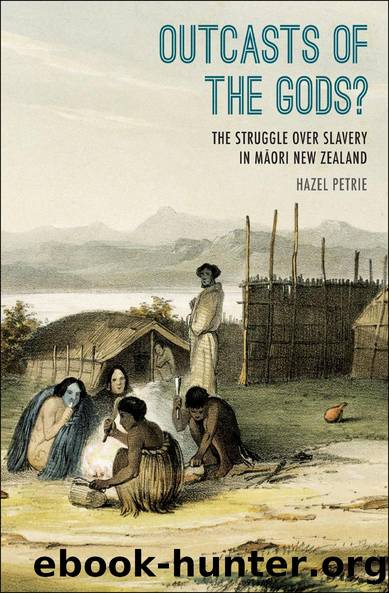Outcasts of the Gods? by Hazel Petrie

Author:Hazel Petrie [Petrie, Hazel]
Language: eng
Format: epub
Tags: History, Australia & New Zealand
ISBN: 9781775587866
Google: E4tjCgAAQBAJ
Publisher: Auckland University Press
Published: 2015-09-25T00:35:56+00:00
Spiritual redemption
Many of the attitudes expressed by the missionaries may have stemmed from their belief that MÄori âslaveryâ was more benign than the trans-Atlantic trade in Africans. But regardless of the extent to which that was the case, a fundamental shared conviction remained that liberty and freedom from slavery were blessings that British colonisation would bestow. And like most of their countrymen, they took it for granted that those blessings were symbolised by the British flag. Indeed, Henry Williams opted to fly the white ensign, based on the cross of St George with the union flag in the top left corner, on the CMS vessels. For him the flag would have symbolised all the noble ideals that Britain, or, perhaps more precisely, England, stood for â ideals that had been reflected in Marsdenâs words as he prepared for his first service in New Zealand.
There was another, probably more important, aspect to missionary âredemptionsâ, though. Their writings frequently reveal that when they redeemed or assumed that they had redeemed MÄori slaves, it was spiritual redemption, rather than physical freedom in this earthly world, that was foremost in their minds. That was their primary objective when entering missionary service and may explain why the word âmanumissionâ does not seem to have been used when payment was made in exchange for slaves.
It is widely accepted that many of Christianityâs earliest converts came from within the Roman Empireâs slave populations. That circumstance, and the fact that redemption has been offered as one of the three key words of the Apostle Paulâs theology, may help to explain the extraordinary role of slave metaphors in the symbolic structure of Christianity. In theological terms, redemption means release from enslavement. Sin condemns a person to slavery but believers are emancipated from sin through Christ.62 Christ is consequently referred to as the âRedeemerâ, and the missionaries surely felt that they were doing his work in a very literal sense. So metaphors may hold the key to understanding not only missionary attitudes but also, perhaps, those of contemporary Britons more generally towards slavery.
Both Wesleyan and CMS missionaries emphasised the doctrine of Christâs atonement over his incarnation in early nineteenth-century New Zealand. Nathaniel Turner wrote that his soul delighted to dwell on âthe Doctrine of General Redemptionâ.63 John King embodied the same sentiment in his address to MÄori at Rangihoua in 1823 about the âslavery of sin and the freedom of the service of Christâ, and again the following year when he offered his listeners a choice between being âchildren of Jehovah or slaves of Satanâ, a concept referred to as the âhinge of Christian truthâ.64 Some ten years later, Richard Davis wrote of his fears that MÄori were âdying fastâ from their exposure to âhaunts of viceâ, adding: âO that the Lord would but subdue the power of Satan and save those wretched, though willing captives from eternal death!â Freedom lies at the core of Christianityâs promise of salvation.65 Thus, Davis used the word âcaptivesâ metaphorically to mean those MÄori who had not converted to Christianity and were thus captives of Satan rather than prisoners of war.
Download
This site does not store any files on its server. We only index and link to content provided by other sites. Please contact the content providers to delete copyright contents if any and email us, we'll remove relevant links or contents immediately.
The Memory Code by Lynne Kelly(2404)
Schindler's Ark by Thomas Keneally(1890)
Kings Cross by Louis Nowra(1799)
Burke and Wills: The triumph and tragedy of Australia's most famous explorers by Peter Fitzsimons(1428)
The Falklands War by Martin Middlebrook(1386)
1914 by Paul Ham(1349)
Code Breakers by Craig Collie(1254)
A Farewell to Ice: A Report from the Arctic by Peter Wadhams(1250)
Paradise in Chains by Diana Preston(1249)
Burke and Wills by Peter FitzSimons(1239)
Watkin Tench's 1788 by Flannery Tim; Tench Watkin;(1232)
The Secret Cold War by John Blaxland(1213)
The Protest Years by John Blaxland(1208)
THE LUMINARIES by Eleanor Catton(1198)
30 Days in Sydney by Peter Carey(1161)
Lucky 666 by Bob Drury & Tom Clavin(1155)
The Lucky Country by Donald Horne(1143)
The Land Before Avocado by Richard Glover(1121)
Not Just Black and White by Lesley Williams(1088)
